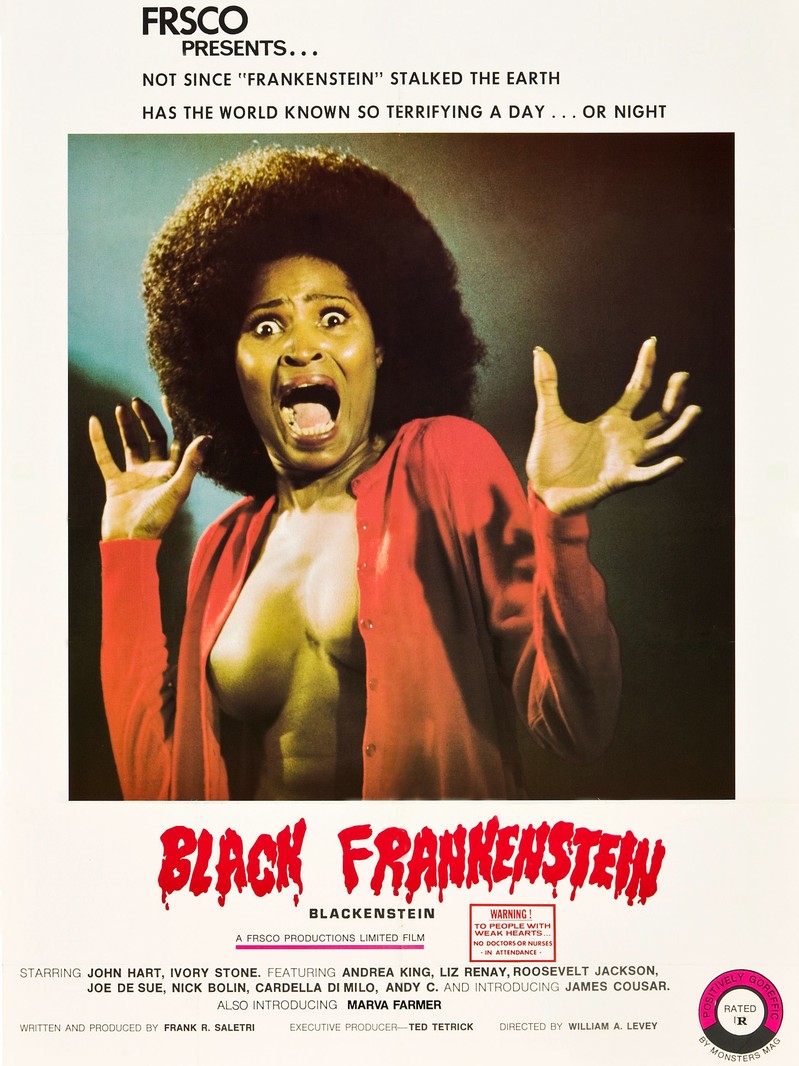It would be easy to assume that Blacula is a cheesy throwaway with camp-only value, but nothing could be farther from the truth. Blackenstein, on the other hand, is a sad, sad excuse for a film. On some level, though, that’s what makes it so good — er, well, bearable. It’s bad in every conceivable way that a movie can be bad — plot, acting, direction, special effects, lighting, sound, editing, and most likely catering — but if you can make your way past the horrendous pacing (hint: fast-forward), there are some unintentional laugh-out-loud moments, such as the hydrogen peroxide bottle in the laboratory with “DNA” scrawled in magic marker on the side.
The story revolves around Dr. Winnifred Walker (Ivory Stone), whose fiance Eddie (Joe De Sue, whose acting is possibly more lifeless before he turns into the monster) loses his arms and legs in Vietnam. She approaches Dr. Stein (John Hart), who supposedly just won the Nobel Peace Prize for “solving the DNA genetic code,” for help. In the midst of attaching Eddie’s limbs, Stein’s butler Malcolm (Roosevelt Jackson, likewise delivering a corpse-like performance) sabotages the experiment because he wants Winnie for himself. As a result, Blackenstein is unleashed to kill indiscriminately.
For all its suckitude, Blackenstein delivers some surprisingly explicit gore, with intestine-ripping scenes years before the likes of Dawn of the Dead (I’m not saying that it’s well done, but it’s there.), as the creature seemingly ends up with a zombie-like taste for human flesh. And if T&A is your thing, it injects multiple scenes of gratuitous nudity as a visual painkiller for suffering viewers.
Unlike similarly punny-titled (yet vastly superior) Blaxploitation horror films Blacula and Dr. Black, Mr. Hyde, Blackenstein is told in a colorblind matter in which race it never an issue. Still, because the main characters are black, there are likely some racial overtones for the audience, such as the imagery of the lumbering black “brute” killing several white female victims (although he’s so slow and easy to evade, I hesitate to call them victims; these deaths should be considered 50% suicide by stupidity).
Thankfully (if that’s the right word), Blackenstein doesn’t focus solely on white women; he throws in a black victim, too: a woman he “saves” from a rapist — one of TWO black male would-be rapists in the film, which doesn’t bode well for its chances of a posthumous NAACP Image Award. On the bright side, the fact that the black female protagonist is an intelligent, respected scientist is notable — a bit of a throwback to Son of Ingagi — so that’s something, I guess.
Writer Frank Saletri is rumored to have directed a film called Black the Ripper in 1975, but it has yet to be found. That’s probably for the best.
